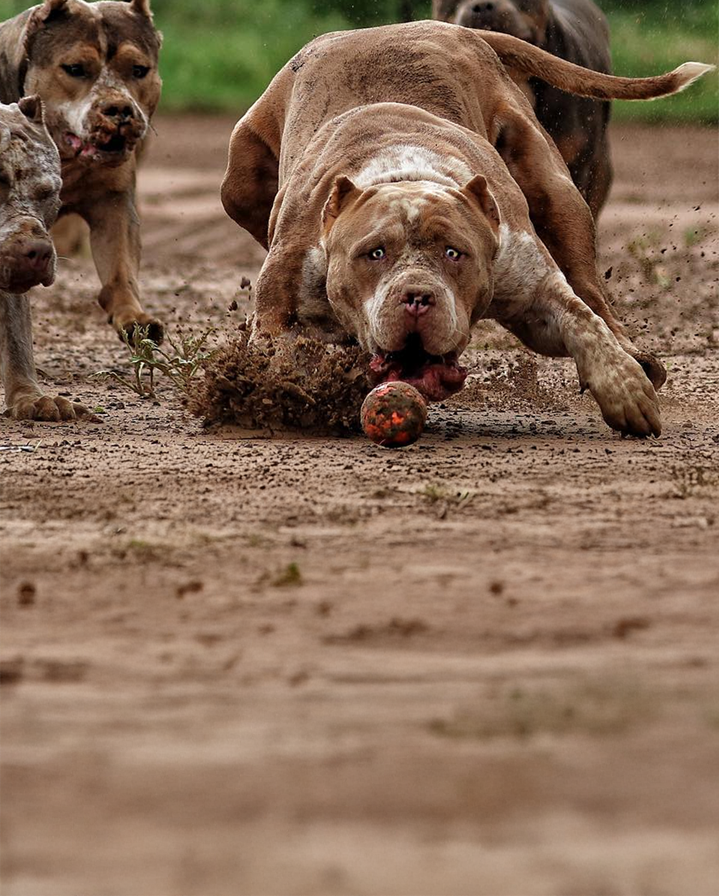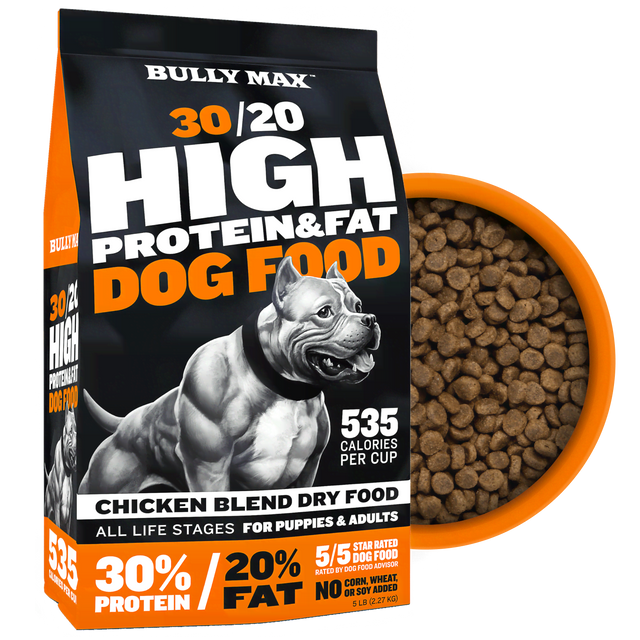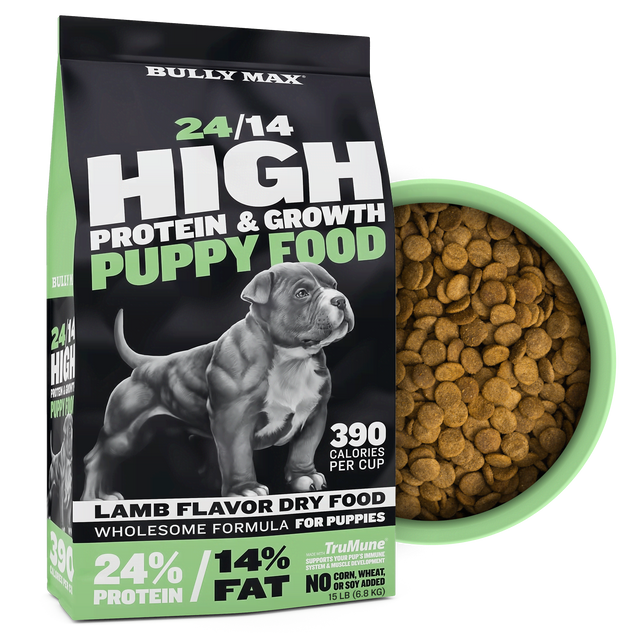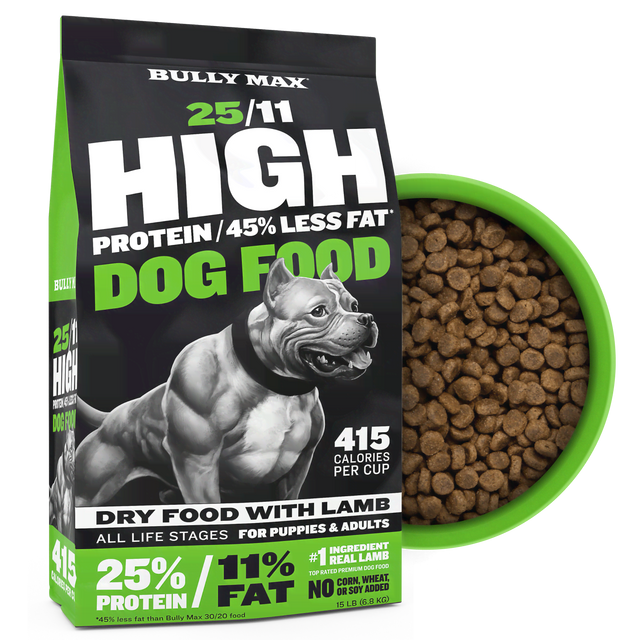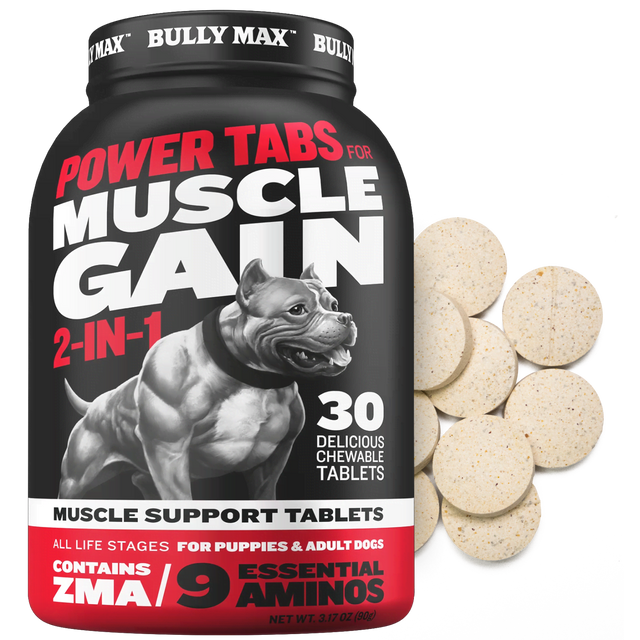How to Choose the Best Puppy Food for Labrador Retrievers
Labrador retrievers are revered as America’s most popular dog breed — and for good reason. Although they were originally bred to help with hunting and fishing, people have adopted Labrador retriever puppies as family dogs. These good-natured, high-energy dogs quickly become a part of the family, as they’re good with nearly everyone.
Growing anywhere between 50 to 80 pounds, Labs make great service dogs, hunting dogs or general companions. Labrador retrievers love to eat, though, leaving them predisposed to obesity and a myriad of health issues that go with it. That’s why it’s important to set your furry companion up for success as a puppy.
This article will cover health issues that Labs commonly deal with and how the right large-breed puppy food can prevent bigger problems later on. We’ll also explain how high-quality dog food like Bully Max can meet your Lab pup’s nutritional needs.
Common Health Concerns in Labs and What to Feed Your Puppy
As a dog owner, it’s important that you’re aware of common health concerns that Labrador retrievers face. Knowing what health obstacles your Labrador pup may face later on in life can help you pick the right diet to prevent issues as they get older.
Hip Dysplasia
 Early signs of hip dysplasia present as limping and painfulness when walking up or down the stairs. Unfortunately, Labs are predisposed to developing hip dysplasia for a number of reasons:
Early signs of hip dysplasia present as limping and painfulness when walking up or down the stairs. Unfortunately, Labs are predisposed to developing hip dysplasia for a number of reasons:
- Types of exercise
- Excessive growth rate
- Improper weight
- Lack of proper nutrition
Some Labrador retrievers are genetically predisposed to developing this condition. By meeting your puppy’s nutritional needs, you can prevent this disease from hindering their quality of life. Choosing a diet designed for large-breed dogs can help prevent excessive growth, which can lead to skeletal diseases (like hip dysplasia) and joint issues. Experts also suggest a diet rich in glucosamine and chondroitin. These supplements can help with your dog’s joints.
Arthritis
Labrador retrievers are at risk for arthritis due to their size, causing joint problems in old age. Veterinarians recommend supplements like glucosamine and chondroitin, along with medications to alleviate pain. In rare cases, a veterinarian may recommend surgery to manage your dog’s pain.
How can you prevent your Labrador from developing arthritis in the first place? Start them on the right diet early on. Like hip dysplasia, starting your Lab puppy on a diet that meets their nutritional needs early on can prevent harm to their joints and skeletal system. Add in regular visits to the veterinarian, the right kind of exercise (e.g., swimming) and supplements, and you can help prevent arthritis from acting up or even developing.
Prevent arthritis with a nutritionally sound diet, including:
- One that is not too rich so that your Lab puppy doesn’t grow too quickly
- Omega-3 fatty acids, such as EPA and DHA, which are found in fish oil
- Antioxidants to fight inflammation
Seizures
Experts say that Labrador retrievers are somewhat predisposed to seizures. In some instances, a mass in the brain, metabolic disturbances, exposure to toxins, anemia or electrolyte imbalances are to blame. Although seizures in Labradors can’t be completely attributed to diet, idiopathic seizures can be helped with nutritional changes.
Some recent studies suggest providing your pup with:
- Small amounts of fruit (e.g., apples and berries)
- Fresh green vegetables
- Eggs
- Edible bones
Start With Healthy Digestion
New research is showing how important probiotics and prebiotics can be for growing puppies — just be sure you provide your pup with probiotics designed for dogs. Developing the right balance of intestinal bacteria from an early age can help support a healthy immune system early on. Ultimately, this will help reduce the occurrence of stomach issues like constipation, diarrhea and digestive tract infections.
Probiotics can help your Lab puppy’s digestive system break down food, improving their immune health and preventing the growth of harmful bacteria. Prebiotics, on the other hand, provide fiber to your puppy. The addition of fiber encourages the growth of healthy bacteria in the colon. All in all, the prebiotics help feed the probiotics.
How Often Should You Feed Your Puppy?
On the topic of health, you should consider how much you are feeding your puppy. Since puppies grow at different rates, there is no black and white answer as to how much they should eat. However, the general rule of thumb is to feed your puppy according to the guidelines on their puppy dry dog food. You should also consider the size, age, activity and energy levels, and medical conditions of your pup when buying dog food.
 As newborns, puppies might be a little round from the puppy formula they’ve gulped down. However, by 12 weeks, your Labrador retriever puppy should have a definite waist. Weight gain is normal for your Labrador pup but should not be in excess. If you find your puppy to be a little more round than recommended, reduce the amount you feed them.
As newborns, puppies might be a little round from the puppy formula they’ve gulped down. However, by 12 weeks, your Labrador retriever puppy should have a definite waist. Weight gain is normal for your Labrador pup but should not be in excess. If you find your puppy to be a little more round than recommended, reduce the amount you feed them.
Alternatively, if you notice your puppy is starting to look a little slim, increase their portion size. If you’re seeing their ribs, shoulder bones, hips, base of their tail, or spine very easily, it’s likely that your puppy is too thin. In this case, it’s best to seek the help of a veterinarian to rule out health issues. Once you have the all-clear from your veterinarian, provide your puppy more nutrient-dense, higher-calorie kibble to meet your lab puppy’s nutritional needs.
Once they start eating dry food, feed your puppy small, frequent meals throughout the day. When you first bring your lab puppy home, you might feed them three to four times a day. Soon enough, you’ll be able to start feeding your pup twice a day.
The most important thing to consider when determining your puppy’s food is that it meets their nutritional needs. The best puppy food for labs should be nutrient-rich, providing your puppy with what they need without having to overeat. For a balanced diet, you should provide your puppy with high-quality food.
How to Find the Best Labrador Puppy Food
What we put in our bodies has a huge impact on our health. The same can be said for dogs. Starting your Lab puppy on a clean, nutritious diet early on is a good way to set their future health on the right track.
The dietary requirements of a 12-week old Labrador retriever puppy are going to vary from when they’re a 13-year-old adult Labrador. Starting your puppy on high-calorie kibble can help them grow and build muscle. Feeding your puppy a nutritionally sound diet early on can help prevent skeletal diseases, such as arthritis. How do you achieve this? Feed your puppy food specifically designed for their nutritional needs. For a Lab puppy, this means a diet for large-breed dogs, containing a higher protein level.
Dietary Requirements
In general, your Lab puppy needs fats, high-quality proteins, carbohydrates, vitamins, minerals and water. Veterinarians have concluded that the main nutritional requirement for Labs is protein. In fact, protein plays a vital role in repairing tissues, maintaining the musculoskeletal system, supplying energy and keeping the immune system up and running.
The second most important nutritional requirement for Labs is fat. For Lab puppies, a fat content of 8% is recommended, although, it’s not an exact science. If your puppy is incredibly active, for example, they might need more fat and protein content than a less active dog.
Although wolves are carnivores, dogs are not. Even though grain-free is a common pet food buzzword, studies show that dogs need to eat grain for healthy heart function. Moreover, there’s an important link between blood taurine levels and heart health. Although it’s too early on to definitively say lower levels of taurine cause heart problems, a grain-free diet doesn’t provide as much taurine.
Eating a variety of foods allows dogs to thrive, gaining access to the right amount of fiber, vitamins and minerals. For the healthiest life, a Lab puppy should eat an omnivorous diet. This means they should not only eat protein but also grains, fruits and vegetables.
Bully Max’s High-Performance Dog Food is designed to give puppies 4 weeks and older the most nutrient-dense food. This meat-based formula uses 100% natural ingredients and is packed with high-quality protein. Staying proactive and making your lab puppy’s health a priority early on can help prevent health complications down the road.
Where other dog food brands fall short, Bully Max steps in. In fact, the proof is in our formula:
- Chicken meal
- Brown rice
- Whole ground flaxseed
- Vitamin E supplement
- Biotin
- Calcium
- Chicken fat (which contain antioxidants)
- Omega 3 fatty acids
- Menhaden fish oil
Our formula provides your labrador pup with a balanced diet, promoting all-around wellness. The perfect balance of carbs, amino acids and other natural ingredients provides food for your pup throughout all their life stages.
Dos and Don’ts of Feeding Your Pup
To start, raw food and processed meats, such as sausage and bacon, should be avoided, as they contain seasonings and salt that can be dangerous to dogs.
Additionally, vegetables, such as a sweet potato, should be cooked before being given to your lab puppy. Although some vegetables can be eaten raw, your puppy might have a sensitive stomach. If you want to feed your Lab puppy raw food, stick with green beans and carrots.
Make sure to remove choking hazards. Feeding your dog a piece of watermelon every once and a while can be a fun dog treat; however, you should remove the seeds. Additionally, some pits and seeds contain cyanide, a toxic chemical that can be harmful to dogs in large amounts.
If you see food labels with “byproduct meal” or “chicken byproduct,” this should ring as a red flag. According to the Association of American Feed Control Officials (AAFCO), rendered products vary greatly. While some rendered products might include the brain and spleens of animals, they can also contain expired meat.
Experts also recommend avoiding preservatives, such as BHA, BHT and ethoxyquin. Studies show these preservatives are carcinogenic and are tied to several serious health conditions. Take ethoxyquin: This preservative is linked to kidney failure, cancer and immune deficiencies.
Lastly, be careful of raw food and the bacteria that can harm your dog. Just like humans, your pup is at risk of contracting salmonella and listeria. For this reason, cooking eggs and fish before you feed them to your dog can help prevent these illnesses.
The Best Food for Labrador Retriever Puppies Is Bully Max
The best type of food for your Labrador retriever puppy is dry dog food or wet food that is specially created with their nutritional needs in mind. When choosing the next bag of pet food, make sure that the package displays a “Nutritional Adequacy Statement” and make sure it’s right for your puppy’s months of age. By checking the package, you can make sure the food has the right nutrition and meets your puppy’s needs.
Bully Max’s 30/20 High-Performance Dog Food is the only performance dog food with a 5/5 star rating for every life stage without fillers, corn gluten meal and byproducts. The best dog food provides a balanced diet and is specially designed with your lab puppy’s needs in mind. Whether this is the first bag you’ll ever buy for your pup or the 100th bag of adult dog food, our formula is designed to keep your dog healthy and wagging their tail.
